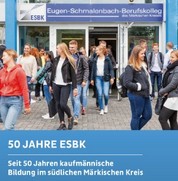Our college is the centre of economic vocational education and training in the south of the district Märkischer Kreis. We are located between the cities of Halver and Lüdenscheid. The city of Altena hosts our subsidiary. In total approximately 2,000 students attend our school, 1,500 students normally go to our main building in Halver/Lüdenscheid and about 500 students attend our branch in Altena.
The so-called “Berufskolleg” is a rather complex type of school, as students have the opportunity to subscribe to many different courses, mainly depending on the type of school leaving certificate they have reached up to 16 years of age.
On the one hand German teenagers have the chance to sign a contract with a company in order to become a qualified assistant in a particular job. This could be an office clerk in an industrial company, bank or shop for example. These apprenticeships normally last three years, in which students go to school twice a week (part time) and do the practical job in the company three times a week. At the end of the apprenticeship they have to pass a written and practical exam and after having passed the exam successfully they can call themselves Industriekaufmann (industrial office clerk), Bankkaufmann (bank clerk) or Einzelhandelskaufmann (retail business management assistant) respectively. These qualifications in Germany are the reason why unemployment among under 25 years old people is relatively low compared to the figures of other European countries. Of course there exists a much wider variety of possible exams focussing on computers, law, wholesale trade, local administration authorities, different types of service jobs etc..
On the other hand those teenagers who have not decided to start an apprenticeship can leave secondary school after year 9 or year 10 with the so-called German “Hauptschulabschluss” or Realschulabschluss (General Certificate of Secondary Education). These pupils have the opportunity to get an entrance qualification for the so-called German “Fachhochschule” (polytechnical college)/ university or they have the intention to reach higher qualifications to be more competitive on the market for qualified apprenticeships (see above). So, depending on the individual quality of the school leaving certificate, they can reach higher qualifications (for example from GCSE to A-levels). These examples describe the career of full time students.
As mentioned in the beginning, the Eugen-Schmalenbach Berufskolleg is the centre of economic vocational training. Because of this all of our students are able to gain a wide variety of competences required in their later jobs. In this context we put special importance on competences in the fields of computers (office, java), business administration (calculation, bookkeeping or cost accounting) and languages (business English, French, Spanish).
Our youngest students are about 15 or 16 years old and stay with us between 1 and 6 years, depending on the individual career choices.








